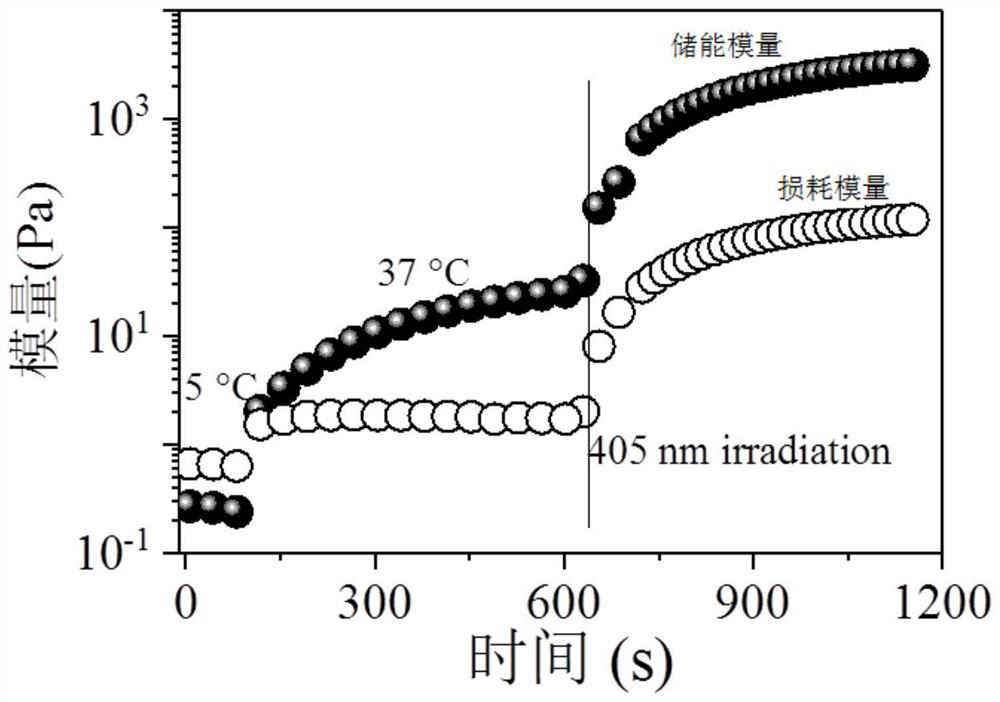A preparation method of dual-response hydrogel ink
A hydrogel, dual-response technology, applied in the field of preparation of dual-response hydrogel ink, can solve the problems of poor reversible temperature response and low stability
- Summary
- Abstract
- Description
- Claims
- Application Information
AI Technical Summary
Problems solved by technology
Method used
Image
Examples
preparation example Construction
[0030] A method for preparing a double-response hydrogel ink of the present invention is specifically implemented according to the following steps:
[0031] Step 1, using the nucleophilic addition reaction of acryloyl chloride and the hydroxyl group of Pluronic F127 to prepare acryloyl F127 (F127DA), specifically:
[0032] Step 1.1: Dissolve Pluronic F127 in anhydrous dichloromethane, place in an ice-water bath at 0°C to 4°C, add triethylamine, and pass through nitrogen for 15 to 20 minutes to obtain a mixture a;
[0033] The molar ratio of Pluronic F127, anhydrous dichloromethane and triethylamine is 1:5:10~20;
[0034] Step 1.2: Add acryloyl chloride dropwise to the mixed liquid a obtained after step 1.1 at a rate of 1 to 2 drops per second, and then place it in an ice-water bath at 0°C to 4°C for 48h to 60h to obtain a reaction mixture , and then filter the reaction mixture, remove the filter residue, and obtain the reaction solution;
[0035] The mass ratio of acryloyl c...
Embodiment 1
[0054] A method for preparing a double-response hydrogel ink of the present invention is specifically implemented according to the following steps:
[0055] Step 1, using the nucleophilic addition reaction of acryloyl chloride and the hydroxyl group of Pluronic F127 to prepare acryloyl F127 (F127DA), specifically:
[0056] Step 1.1: Dissolve Pluronic F127 in anhydrous dichloromethane, place in an ice-water bath at 0°C, add triethylamine, and pass through nitrogen for 15 minutes to obtain a mixture a;
[0057] The molar ratio of Pluronic F127, anhydrous dichloromethane and triethylamine is 1:5:10;
[0058] Step 1.2: Add acryloyl chloride dropwise to the mixture a obtained after step 1.1 at a rate of 1 drop per second, and then place it in an ice-water bath at 0°C for 48 hours to obtain a reaction mixture, and then filter the reaction mixture , remove filter residue, obtain reaction solution;
[0059] The mass ratio of acryloyl chloride to mixed liquid a is 1:10;
[0060] Ste...
Embodiment 2
[0077] A method for preparing a double-response hydrogel ink of the present invention is specifically implemented according to the following steps:
[0078] Step 1, using the nucleophilic addition reaction of acryloyl chloride and the hydroxyl group of Pluronic F127 to prepare acryloyl F127 (F127DA), specifically:
[0079] Step 1.1: Dissolve Pluronic F127 in anhydrous dichloromethane, place in an ice-water bath at 0°C, add triethylamine, and pass through nitrogen for 18 minutes to obtain a mixture a;
[0080] The molar ratio of Pluronic F127, anhydrous dichloromethane and triethylamine is 1:5:15;
[0081] Step 1.2: Add acryloyl chloride dropwise to the mixture a obtained after step 1.1 at a rate of 1 drop per second, and then place it in an ice-water bath at 2°C for 50 hours to obtain a reaction mixture, and then filter the reaction mixture , remove filter residue, obtain reaction solution;
[0082] The mass ratio of acryloyl chloride to mixed liquid a is 1:12;
[0083] Ste...
PUM
 Login to View More
Login to View More Abstract
Description
Claims
Application Information
 Login to View More
Login to View More - R&D
- Intellectual Property
- Life Sciences
- Materials
- Tech Scout
- Unparalleled Data Quality
- Higher Quality Content
- 60% Fewer Hallucinations
Browse by: Latest US Patents, China's latest patents, Technical Efficacy Thesaurus, Application Domain, Technology Topic, Popular Technical Reports.
© 2025 PatSnap. All rights reserved.Legal|Privacy policy|Modern Slavery Act Transparency Statement|Sitemap|About US| Contact US: help@patsnap.com

